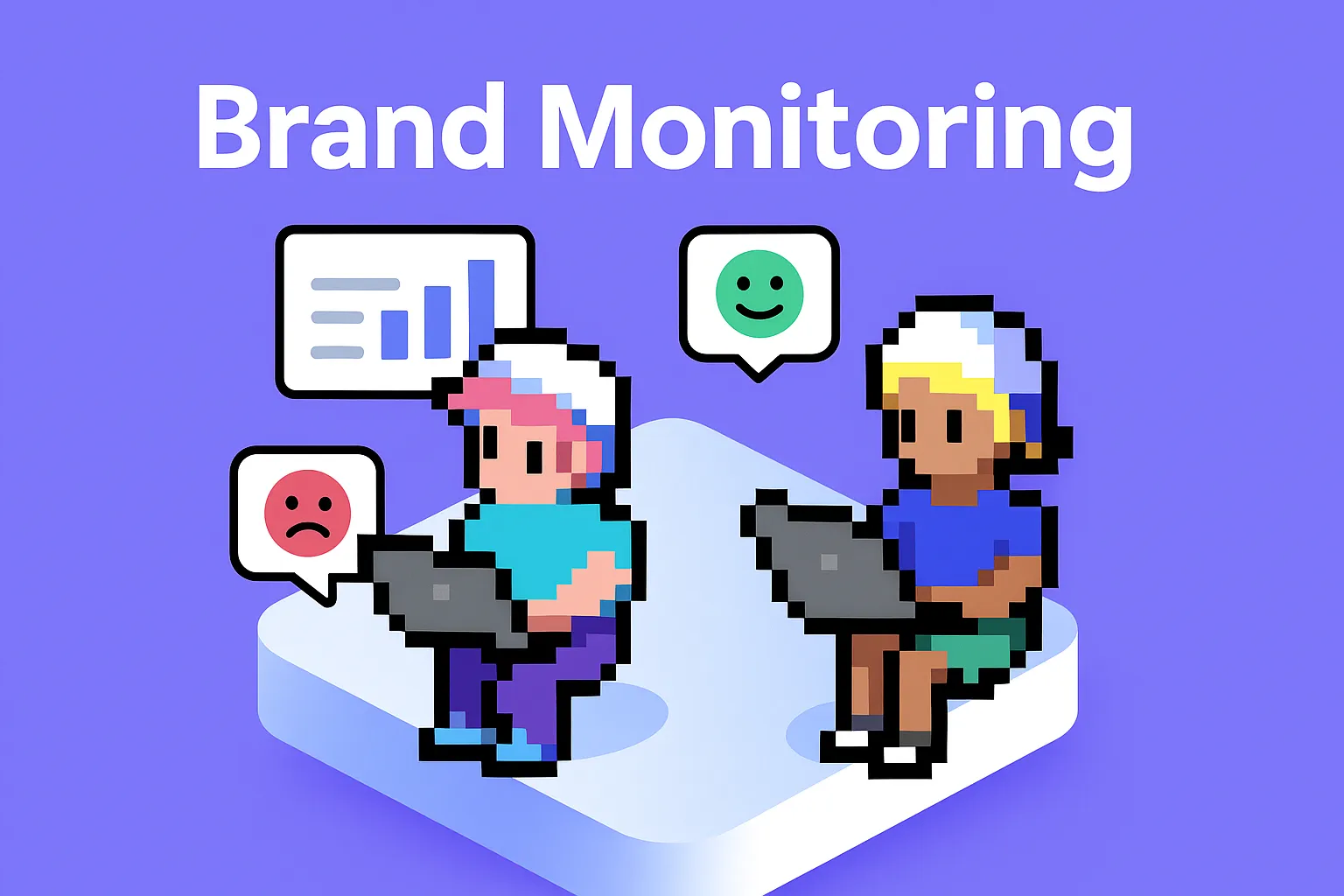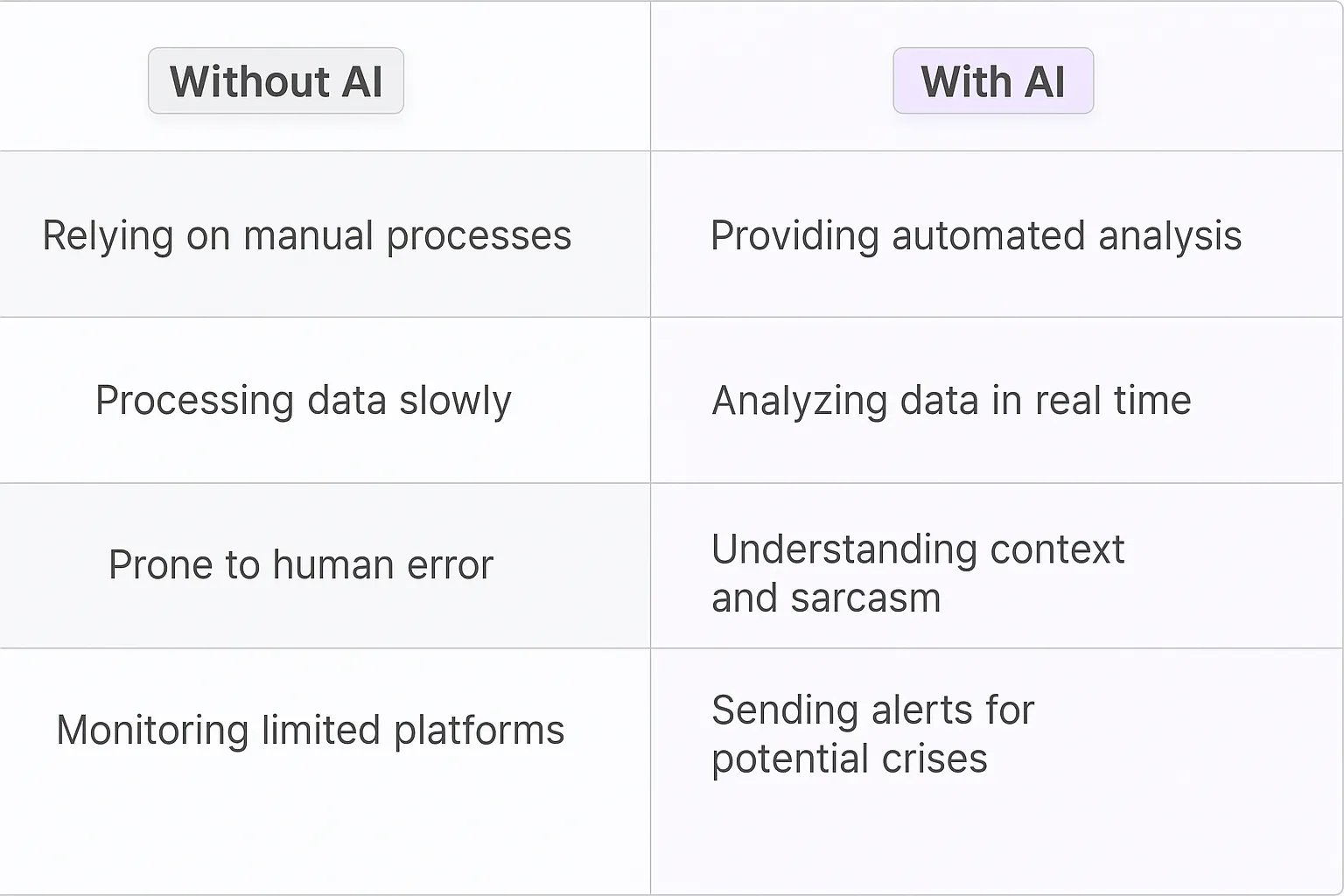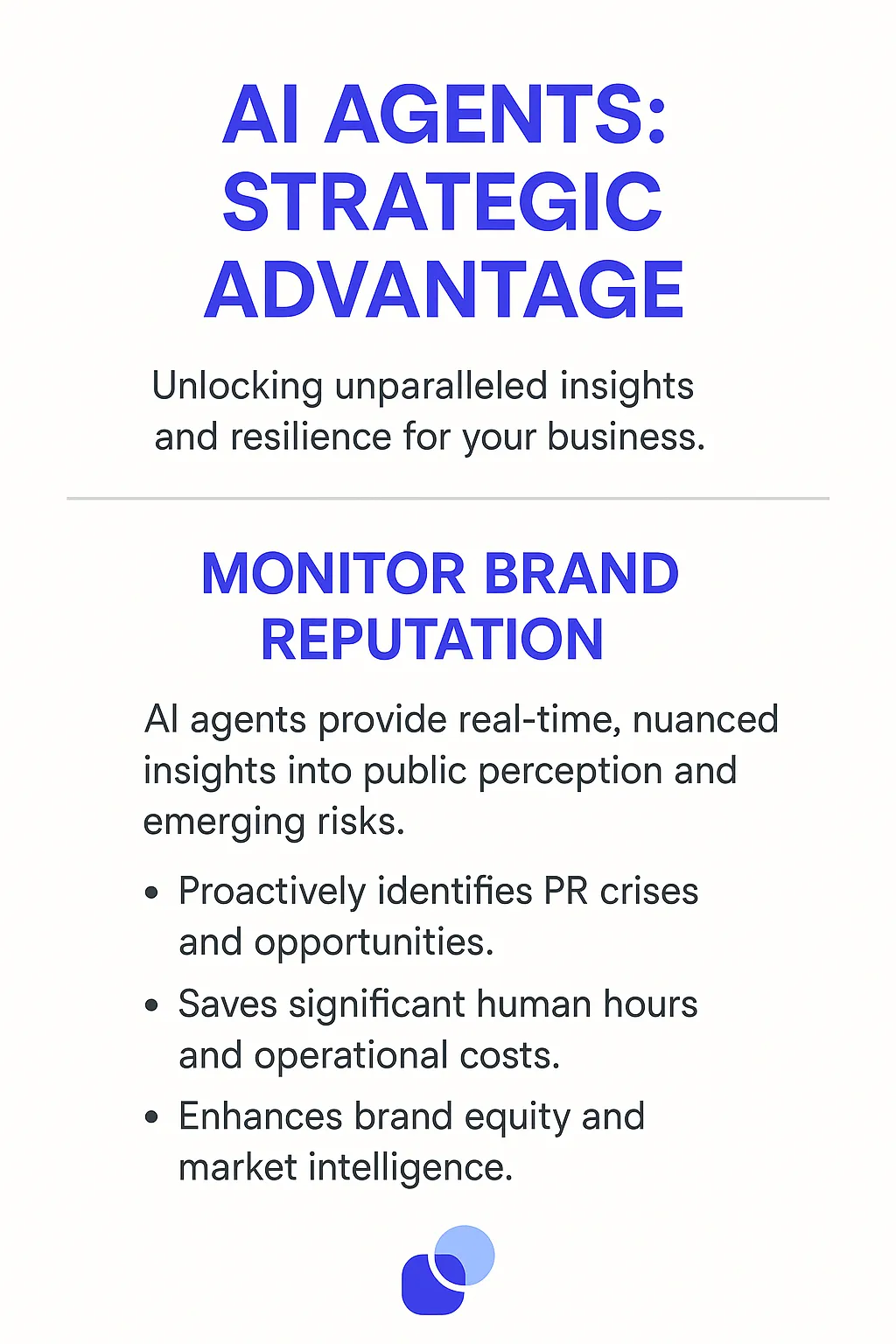Brand Monitoring AI Agents
The Evolution of Brand Monitoring with AI Agents
Brand monitoring is the process of tracking, analyzing, and responding to mentions of a company, product, or individual across various digital platforms. It's like having a finger on the pulse of public opinion, allowing businesses to understand how they're perceived in real-time. In the digital age, brand monitoring has become crucial for maintaining reputation, identifying opportunities, and navigating potential crises.
Brand monitoring powered by AI agents offers a suite of game-changing features:1. Real-time sentiment analysis across multiple platforms2. Trend identification and prediction3. Automated alerts for potential crises or viral content4. Competitive intelligence gathering5. Influencer identification and tracking6. Multi-language support for global brand management7. Customizable reporting and analytics8. Integration with existing marketing and CRM systems9. Proactive suggestion of engagement strategies10. Scalability to handle growing data volumes as brands expand

Benefits of AI Agents for Brand Monitoring
What would have been used before AI Agents?
Before AI agents entered the scene, brand monitoring was a labor-intensive process that often felt like trying to drink from a firehose. Companies relied on teams of analysts manually sifting through social media posts, news articles, and customer feedback. It was slow, inefficient, and prone to human error. You'd have marketing interns spending hours scrolling through Twitter feeds, trying to catch every mention of your brand. The result? A lot of missed opportunities and delayed responses to potential crises.
What are the benefits of AI Agents?
AI agents are transforming brand monitoring into a real-time, high-precision operation. These digital teammates are like having thousands of tireless analysts working 24/7, processing vast amounts of data at superhuman speeds. They're not just faster; they're smarter too.
First off, AI agents can detect nuanced sentiment analysis and context in ways that keyword-based tools never could. They understand sarcasm, idioms, and cultural references, giving you a true pulse on how people feel about your brand. This level of insight is gold for marketers and product teams alike.
Moreover, these AI agents are pattern recognition machines. They can spot emerging trends or potential issues before they blow up, giving you a chance to get ahead of the curve. Imagine being able to predict and prepare for a viral moment before it happens – that's the kind of edge AI agents can provide.
But here's where it gets really interesting: AI agents don't just monitor; they can engage. They can draft responses to customer queries, flag high-priority issues for human review, and even suggest content strategies based on what's resonating with your audience. It's like having a hyper-intelligent brand guardian that never sleeps.
The scalability is mind-boggling too. As your brand grows and enters new markets, AI agents can effortlessly expand their monitoring scope, learning new languages and cultural contexts on the fly. This kind of adaptability is crucial in our globalized, fast-moving digital economy.
Ultimately, AI agents for brand monitoring aren't just tools; they're strategic assets. They free up your human talent to focus on high-level strategy and creative tasks while ensuring you never miss a beat in the ongoing conversation about your brand. In the attention economy, that level of omniscience and responsiveness isn't just nice to have – it's becoming table stakes for any brand that wants to stay relevant and resilient.

Potential Use Cases of AI Agents with Brand Monitoring
Processes
Brand monitoring AI agents are game-changers in the world of digital marketing and reputation management. These digital teammates can transform how companies track and respond to their online presence. Let's dive into some key processes where they shine:
- Real-time sentiment analysis: AI agents can continuously scan social media, news sites, and forums, providing instant insights into public perception of your brand.
- Competitive intelligence gathering: These agents can track competitors' online activities, product launches, and customer reactions, giving you a strategic edge.
- Crisis detection and management: By identifying potential PR issues early, AI agents enable rapid response strategies before problems escalate.
- Influencer identification and tracking: AI can pinpoint key opinion leaders in your industry and monitor their interactions with your brand.
- Content performance analysis: These digital teammates can assess how your brand's content resonates across different platforms and demographics.
Tasks
Breaking down the processes into specific tasks, brand monitoring AI agents excel at:
- Generating daily or real-time reports on brand mentions across various online channels
- Categorizing mentions by sentiment (positive, negative, neutral) and urgency
- Alerting team members to sudden spikes in negative sentiment or potential viral content
- Tracking specific keywords or phrases related to product features, campaigns, or industry trends
- Compiling competitor analysis reports, highlighting their strengths and weaknesses
- Identifying emerging trends or topics relevant to your brand
- Suggesting response strategies for different types of brand mentions or customer feedback
- Automating responses to common queries or comments across social platforms
- Creating visual data representations of brand performance over time
- Flagging potential copyright infringements or unauthorized use of brand assets
In the fast-moving world of brand management, these AI agents act as tireless sentinels, providing invaluable insights and freeing up human creativity for strategic decision-making. They're not just tools; they're digital teammates that amplify human capabilities in the never-ending quest to build and protect brand equity.

Industry Use Cases: Brand Monitoring AI Agents
The versatility of AI agents in brand monitoring makes them valuable across various industries. Let's dive into some meaty, industry-specific use cases that showcase how AI can transform workflows and processes.
Brand monitoring AI agents are like having a team of tireless analysts working 24/7, sifting through the digital noise to extract meaningful signals. They're not just tools; they're digital teammates that can radically alter how businesses perceive and interact with their market presence.
These AI-powered brand monitors don't just collect data – they interpret it, contextualize it, and serve it up in ways that can drive real business decisions. They're the difference between drowning in information and surfing the wave of consumer sentiment.
As we explore these use cases, keep in mind that we're not just talking about incremental improvements. We're looking at fundamental shifts in how brands understand and respond to their market position. These AI agents are rewriting the rules of engagement in the brand-consumer relationship.
Retail: Elevating Brand Perception with AI-Powered Monitoring
The retail landscape is a battlefield of perception, and brand monitoring AI agents are the secret weapons smart companies deploy to win hearts and wallets. Let's dive into how a major sneaker brand could leverage these digital teammates to dominate the market.
Picture Nike, always on the cutting edge. They deploy a fleet of brand monitoring AI agents across social media, review sites, and news outlets. These agents don't just collect mentions; they're parsing sentiment, identifying trends, and spotting potential PR crises before they explode.
Here's where it gets interesting: The AI doesn't just report data. It's proactively suggesting actions. When it detects a surge of posts about a new colorway dropping, it flags this to the marketing team, recommending a flash sale to capitalize on the buzz. If there's a spike in complaints about a particular shoe's durability, it alerts product development and customer service simultaneously, enabling rapid response and product improvement.
But the real magic happens in the micro-interactions. The AI identifies micro-influencers who consistently generate positive engagement about Nike products. It suggests personalized outreach strategies for each, potentially turning casual fans into brand ambassadors. This granular approach allows Nike to build authentic relationships at scale, something that was previously impossible.
The result? Nike stays ahead of the curve, addressing issues before they become problems and amplifying positive sentiment. They're not just reacting to the market; they're shaping it. This is how you turn a brand into a cultural force – by listening and responding with superhuman precision and speed.
In the attention economy, brand monitoring AI agents aren't just tools; they're the difference between setting trends and chasing them. For retailers willing to embrace this tech, it's game on.
Finance: AI-Driven Brand Monitoring in the Crypto Wild West
Let's talk about the crypto space - a realm where reputation can make or break you faster than you can say "blockchain." Enter Coinbase, the poster child of crypto exchanges, navigating a landscape that's equal parts gold rush and minefield.
Coinbase deploys a squad of brand monitoring AI agents that are essentially digital bloodhounds, sniffing out every mention across the vast expanse of the internet. But these aren't your grandpa's monitoring tools. They're parsing through the noise with the precision of a neurosurgeon and the speed of a quantum computer.
These AI agents are doing more than just tallying mentions. They're decoding the crypto community's sentiment in real-time, identifying emerging narratives, and flagging potential trust issues before they snowball. When a new meme coin starts trending, the AI doesn't just note it - it analyzes the sentiment, gauges the potential impact on Coinbase's reputation if they don't list it, and even suggests a communication strategy.
The real power move? These AI agents are tapping into the crypto zeitgeist. They're identifying key opinion leaders in various crypto niches - from DeFi enthusiasts to NFT artists - and suggesting tailored engagement strategies. This allows Coinbase to build authentic relationships with community pillars, turning potential critics into advocates.
When FUD (Fear, Uncertainty, Doubt) starts spreading about a potential security breach, the AI doesn't just raise an alarm. It categorizes the source of the rumors, cross-references with past incidents, and suggests a multi-pronged response strategy - all before the C-suite has had their morning coffee.
The result? Coinbase isn't just reacting to the market; it's anticipating and shaping the conversation. In a space where trust is as volatile as the assets being traded, this level of brand monitoring is the difference between being seen as a rock in the storm or just another ship being tossed about.
For crypto companies, brand monitoring AI isn't a nice-to-have - it's survival gear. It's the difference between riding the waves of crypto winters and summers, and being swept away by the first big swell. In this high-stakes game, the players who leverage AI to truly understand and engage their community won't just survive - they'll thrive.
Considerations
Technical Challenges
Implementing a Brand Monitoring AI Agent isn't a walk in the park. It's more like trying to teach a robot to understand the nuances of human communication – in every language, across every platform, 24/7. The technical hurdles are real, and they're not for the faint of heart.
First up, we're dealing with massive data ingestion. We're talking about drinking from a firehose of social media posts, news articles, forum discussions, and more. Your AI needs to be able to handle this constant influx without choking or missing a beat. It's like trying to listen to every conversation in a packed stadium – simultaneously.
Then there's the natural language processing (NLP) challenge. Your AI needs to understand context, sarcasm, slang, and regional dialects. It's not just about keyword matching anymore. We're in the realm of sentiment analysis, entity recognition, and contextual understanding. Your AI needs to know the difference between "This product is bad" and "This product is bad-ass" – and trust me, that's harder than it sounds.
Let's not forget about the multi-language support. If your brand is global (or aspires to be), your AI needs to be a polyglot. It needs to understand and analyze content in multiple languages, accounting for cultural nuances and idiomatic expressions. It's like expecting your AI to be fluent in Mandarin, Spanish, and Klingon all at once.
Operational Challenges
On the operational side, things get even trickier. You're not just building an AI; you're integrating it into your existing workflows and systems. It's like trying to introduce a new player to a well-oiled sports team mid-season.
First, there's the issue of data privacy and compliance. Your AI is going to be processing a ton of public data, but you need to ensure you're not crossing any legal or ethical lines. GDPR, CCPA, and other data protection regulations are watching you like hawks. One misstep, and you're in hot water.
Then there's the challenge of false positives and negatives. Your AI needs to be sensitive enough to catch subtle brand mentions but not so sensitive that it floods your team with irrelevant alerts. It's a delicate balance, and getting it wrong can either leave you blind to potential crises or buried under a mountain of useless notifications.
Let's talk about the human factor. Your team needs to learn how to work with this new AI teammate. They need to understand its capabilities, its limitations, and how to interpret its outputs. It's not about replacing humans; it's about augmenting them. But that requires a shift in mindset and workflows that doesn't happen overnight.
Finally, there's the ever-present challenge of keeping your AI up-to-date. The digital landscape is constantly evolving. New platforms emerge, language trends change, and your AI needs to keep pace. It's like trying to hit a moving target while riding a unicycle – backwards.
Implementing a Brand Monitoring AI Agent is no small feat. But for those who can navigate these challenges, the payoff in terms of brand insights and rapid response capabilities can be game-changing. Just remember, it's a marathon, not a sprint – and you're running it on a treadmill that's constantly speeding up.
The Future of Digital Brand Management: AI-Powered Insights
Brand monitoring AI agents are not just tools; they're transformative digital teammates that are reshaping how companies interact with their market. By providing real-time insights, predictive analytics, and proactive suggestions, these AI agents enable brands to stay ahead of the curve in an increasingly complex digital landscape. They're turning the overwhelming task of monitoring brand perception into a strategic advantage, allowing companies to respond faster, engage more authentically, and make data-driven decisions with unprecedented accuracy.
However, implementing these AI agents comes with its own set of challenges, from technical hurdles like massive data processing and advanced NLP to operational issues like compliance and team integration. But for companies willing to navigate these challenges, the rewards are substantial. In an era where brand perception can change in the blink of a tweet, having AI-powered brand monitoring isn't just an advantage – it's becoming a necessity for staying relevant and resilient in the digital age.
As we move forward, we can expect these AI agents to become even more sophisticated, potentially predicting market trends and customer behavior with uncanny accuracy. The future of brand monitoring is here, and it's powered by AI. Companies that embrace this technology now will be well-positioned to thrive in the increasingly complex and fast-paced world of digital brand management.













